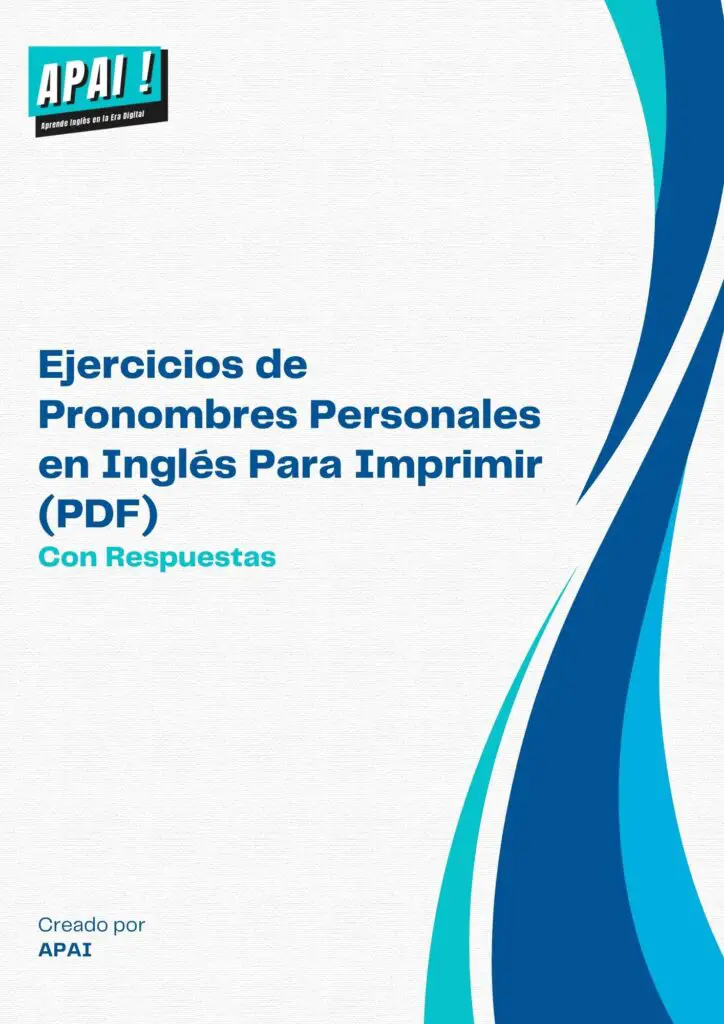Pronombre Personales en Inglés: Definición
Los pronombres personales en inglés son palabras que usamos para referirnos a personas o cosas sin especificar sus nombres. Nos ayudan a evitar repetir sustantivos en una oración y hacen que nuestro lenguaje sea más eficiente. Los pronombres personales son una parte esencial de la comunicación cotidiana. Aquí están los pronombres personales más comúnmente utilizados en inglés:
Subject Pronouns:
- I (first person singular)
- You (second person singular or plural)
- He (third person singular, masculine)
- She (third person singular, feminine)
- It (third person singular, neutral or inanimate)
- We (first person plural)
- They (third person plural)
Object Pronouns:
- Me (first person singular)
- You (second person singular or plural)
- Him (third person singular, masculine)
- Her (third person singular, feminine)
- It (third person singular, neutral or inanimate)
- Us (first person plural)
- Them (third person plural)
Ejercicios con Pronombres Personales en Inglés Para Imprimir (PDF)

Instructions: Fill in the blank with the correct personal pronoun.
- ___ am going to the store. (I/Me)
- The book belongs to ___. (I/Me)
- ___ and my friend are going to the park. (I/Me)
- The teacher gave ___ a good grade. (I/Me)
- ___ is my brother’s birthday today. (He/Him)
- The gift is for ___. (He/Him)
- ___ and his friends are playing soccer. (He/Him)
- Can you help ___ with this problem? (He/Him)
- ___ is baking cookies. (She/Her)
- The flowers are for ___. (She/Her)
- ___ and her sister are studying together. (She/Her)
- The teacher praised ___ for her hard work. (She/Her)
- ___ is eating an apple. (It/Its)
- The dog is wagging ___ tail. (It/Its)
- The cat is licking ___ paw. (It/Its)
- The bird is flapping ___ wings. (It/Its)
- ___ are going to the movies. (We/Us)
- The tickets are for ___. (We/Us)
- ___ and our friends are having a picnic. (We/Us)
- The coach selected ___ for the team. (We/Us)
- ___ are playing video games. (They/Them)
- The gifts are for ___. (They/Them)
- ___ and their friends are at the park. (They/Them)
- The teacher gave ___ a group project. (They/Them)
- ___ is my best friend. (You/Your)
- This is ___ book. (You/Your)
- ___ and I are going to the concert. (You/Your)
- I have a gift for ___. (You/Your)
- ___ is my cousin. (He/Him)
- This is ___ bike. (He/Him)
- ___ and I are playing chess. (He/Him)
- I have a surprise for ___. (He/Him)
- ___ is my aunt. (She/Her)
- This is ___ purse. (She/Her)
- ___ and I are going shopping. (She/Her)
- I have a letter for ___. (She/Her)
- ___ is a beautiful country. (It/Its)
- This is ___ flag. (It/Its)
- ___ and its neighboring countries are in Europe. (It/Its)
- I have a map of ___. (It/Its)
- ___ are my parents. (They/Them)
- These are ___ passports. (They/Them)
- ___ and their friends are going camping. (They/Them)
- I have presents for ___. (They/Them)
- ___ are my classmates. (We/Us)
- This is ___ project. (We/Us)
- ___ and our teacher are going on a field trip. (We/Us)
- The principal has a message for ___. (We/Us)
- ___ is my neighbor. (You/Your)
- This is ___ dog. (You/Your)
Answer Key
- I
- Me
- I
- Me
- It
- Him
- He
- Him
- She
- Her
- She
- Her
- It
- Its
- Its
- Its
- We
- Us
- We
- Us
- They
- Them
- They
- Them
- You
- Your
- You
- You
- He
- His
- He
- Him
- She
- Her
- She
- Her
- It
- Its
- It
- It
- They
- Their
- They
- Them
- We
- Our
- We
- Us
- You
- Your